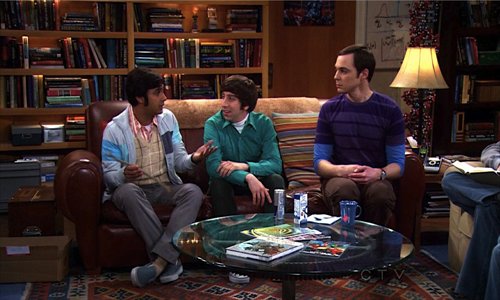Ads go abroad
Product placement is not a new concept for Chinese audiences. From television dramas to films, online websites to music videos, stealthy, or sometimes not so stealthy advertisements appear everywhere. Since product placement was first introduced to China, verbal attacks of its commercial value have surfaced. Recently, a Chinese milk brand placed blatantly in the popular broadcast American sitcom, The Big Bang Theory, has reignited discourse on product placement. Though the way audiences view the new trend of stealth marketing in foreign films is varied - reactions range from a sense of pride to annoyance - it's clear that marketing managers are seizing the opportunity to branch out overseas to target Chinese consumers.
Sheldon loves Chinese milk
Six minutes into the 17th episode of the fifth season of The Big Bang Theory, a carton of Shuhua milk, a product distributed by Yili Industrial Group based in China's Inner Mongolia Autonomous Region, surfaces. The milk appears on the table of the home of the two leading characters in the comedy, Sheldon and Leonard. For the rest of this episode, Shuhua milk appears more than once. This incident of product placement in a popular American sitcom sparked people's attention, considering the widespread popularity The Big Bang Theory enjoys in China.
Broadcasted by CBS on September 24, 2007, The Big Bang Theory became one of America's most popular dramas in just three years, with an audience rating of 15 million per week. In China, the series drew a number of loyal fans, especially among university students and white collars workers.
The milk placement ignited an intense discussion about Chinese product placement in American shows. "I can't believe a Chinese milk brand appeared on the table of Sheldon's table," said Yao Bohua, an employee at an electric equipment in Shanxi Province. "It's so obvious as an advertisement, and it's also a little strange to me," he said. "I don't think it's weird," said Lu Yan, a worker at a textile company in Beijing. She thinks the sitcom has done a good job of weaving the brand into the story. As Leonard is lactose intolerant, it's not completely unusual for Shuhua milk to appear on the table. Shuhua has branded itself as an effective dairy option for people suffering from lactose intolerance.
Heading West
"Since the beginning of 2012, Chinese product placement in American television dramas has become a sort of trend," said Liu Siru, president of Filmworks China Entertainment Marketing Limited in Beijing. Liu's company helps Chinese corporations transition their products into American films and shows. Liu says that as of now, they have over 20 Chinese enterprises as clients. One retail client, she revealed, will appear on the new season of American television drama, Gossip Girl.
The company has successfully aided Chinese enterprises, such as TCL, a home appliance manufacturer, and Yili, in placing their brand in the past two Transformers films. Shuhua's appearance in The Big Bang Theory is just another incident. "It's a new opportunity, and more and more Chinese enterprises are looking to foreign dramas and films as a way to promote their products," said Liu.
"Many Chinese streaming websites are buying copyrights of foreign dramas and movies to cater to domestic taste," she said. The easy access of these shows ensures a high number of Chinese audiences. Also, due to recent reform of government policies, there will be 14 more foreign IMAX or 3D movies released in China this year, in addition to the 20 films set by previous quotas.

Another incentive for corporations to solicit product placement in Western productions is the low cost, according to Liu. She says that spectators needn't worry too much. Liu asserts that foreign standards are high. "They will not allow product placement with obvious commercial value appear in a show. The product must fit into the narrative," Liu said.
Audience approval
In recent years, product placement in the domestic market has received negative feedback, for its tactless appearance. "They just come out of nowhere," said Lu Yan. "The commercial motive is so obvious; it lacks class and makes me queasy," Lu told the Global Times. But Lu finds the placement of Shuhua milk in The Big Bang Theory somewhat relevant. Industry professionals also have their say: "It would be great if brands that need to be incorporated are told to playwrights before they begin writing the script" said Wang Boquan, director of publicity at Huacheng Media in Beijing. "This way they can incorporate it in the storyline organically."
For example, the second season of Star City, a hip TV show shot by Huacheng Media, which has just finished shooting, is not shy to product placement. "There is a lot of product placement in the series, but to keep the show's integrity, we avoided using character lines to highlight the brands," Wang said. Incorporating them naturally does not disrupt the structure of the story, Wang told the Global Times.
"Product placement has become an important aspect in the movie industry," said Zhang Hongsen, deputy director of the Film Bureau under the State Administration of Radio Film and Television. Relying solely on the box office for profit is not realistic in the movie industry. But Zhang stressed that producers and directors must respect the aesthetic request of audiences and realize that at most, products in a movie function merely as a background.